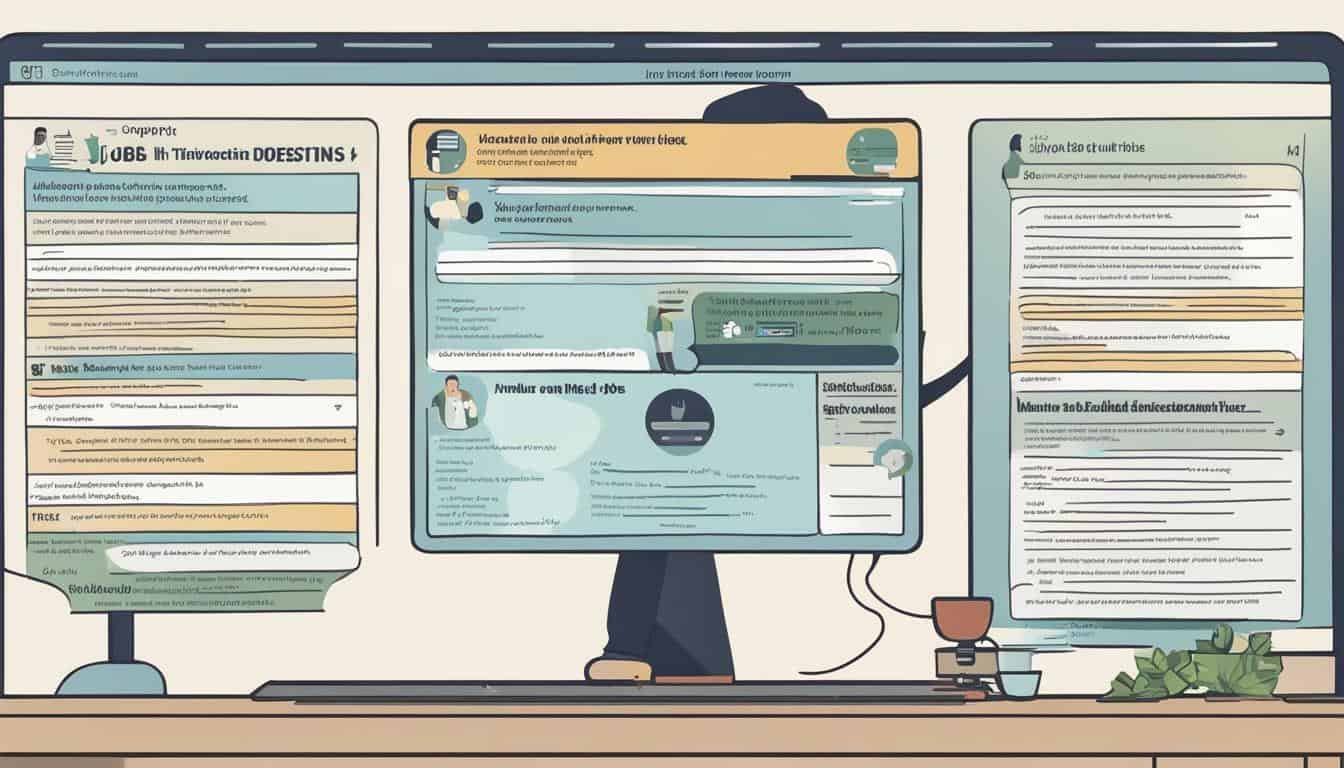At some point in your career, you may find yourself faced with the decision to leave your current job. Whether it’s due to a toxic work environment, lack of growth opportunities, or simply feeling unfulfilled, understanding your reasons for leaving is critical to charting your career path.
By examining the factors that contribute to job dissatisfaction and turnover, you can better identify what matters most to you in a job and take steps to find a position that meets your needs and aspirations.
Key Takeaways:
- It’s important to understand your reasons for leaving a job in order to make informed career decisions.
- Factors such as job dissatisfaction, lack of growth opportunities, inadequate compensation, and toxic work environments can all contribute to turnover.
- By identifying what matters most to you in a job, you can take steps to find a position that meets your needs and aspirations.
Job Dissatisfaction: A Common Motivator
It’s not uncommon to feel dissatisfied with your job at some point in your career. Job dissatisfaction can stem from a variety of factors, including but not limited to:
- Lack of fulfillment in your role
- A challenging work environment
- Limited opportunities for growth and development
When you spend a large portion of your time at work, it’s essential to enjoy what you do. Job satisfaction can directly impact your overall well-being and quality of life. If you find yourself experiencing job dissatisfaction, it may be time to reevaluate your current work situation.
Start by identifying the specific factors contributing to your dissatisfaction. Are you feeling unfulfilled in your role? Do you feel restricted in your professional development? Understanding the root of the problem can help you make an informed decision about your next steps.
It’s also essential to remember that job dissatisfaction can be a motivator for change. This dissatisfaction can lead to exploring new job opportunities, pursuing new career paths, or enhancing your skills through education or training.
Ultimately, job satisfaction is crucial for your career success and overall well-being. If you’re experiencing job dissatisfaction, take the time to evaluate your situation and consider making changes that will improve your work-life.
Lack of Growth Opportunities: Stifling Career Progression
Many individuals leave their jobs due to a lack of growth opportunities. When you’re not provided with sufficient avenues for professional growth, it can feel stifling and limiting to your career progression. You may feel as though you’re not being challenged enough or that your potential is not being fully utilized.
This lack of growth can manifest in a variety of ways. Perhaps you feel as though you’re not learning new skills, or that your responsibilities aren’t expanding. Maybe you’ve hit a ceiling in terms of promotions or salary increases.
| Scenario | Lack of Growth Opportunity |
|---|---|
| Working at a small company with no room for advancement | Feeling stuck in your current position with no possibility for upward mobility |
| Working in a stagnant industry | Feeling as though there are limited opportunities for innovation or growth in your field |
Feeling trapped and stagnant in your current job can lead to frustration and burnout. It may be time to seek out new opportunities that offer more room for growth and advancement.
However, it’s important to remember that growth opportunities aren’t just about climbing the corporate ladder. They can also involve developing new skills, taking on new challenges, and pursuing projects that align with your interests and passions.
If you feel as though you’re not being provided with sufficient growth opportunities in your current role, consider speaking with your manager about your career goals. You may be able to work together to create a plan for your professional development within the company. If not, it may be time to start exploring other options that better align with your aspirations.
Inadequate Compensation: Financial Motivations
Money may not be the sole factor in job satisfaction, but it undoubtedly influences your overall career trajectory. Inadequate compensation can demotivate you and even make you resentful towards your job. Unless you’re financially secure, an insufficient salary can be a major stressor that affects all aspects of your life.
It’s important to note that the amount you earn is just as important as the value you perceive it to have. Fair pay is a fundamental pillar for employee motivation and retention. According to a Glassdoor survey, 67% of employees said that pay raises would boost their job satisfaction, while 32% said they would search for other job opportunities if their income didn’t increase.
| Lack of Fair Compensation: | Consequences |
|---|---|
| Lack of motivation | Low productivity |
| Feeling undervalued | Decreased loyalty to the company |
| Financial stress | Reduced job satisfaction |
If you’re unhappy with your current pay, you have options to negotiate a raise or seek better-paying opportunities. Research the market for your position and compare your salary with industry standards. If you’re underpaid, have a conversation with your employer about a raise or other forms of compensation, such as bonuses or benefits.
If a raise is not possible, it may be time to explore other job opportunities. Be transparent with potential employers about your salary expectations and negotiate accordingly. Remember that money is not everything, but it’s essential to provide for your basic needs and achieve financial stability.
Toxic Work Environment: Health and Well-being Concerns
One of the most common reasons for leaving a job is a toxic work environment. A toxic work environment can be defined as a workplace where negative behavior, attitudes, and culture are prevalent, leading to a detrimental effect on employees’ mental and physical health.
Some of the signs of a toxic work environment include bullying, harassment, discrimination, micromanagement, excessive workload, and lack of support from management. These factors can lead to stress, anxiety, burnout, and depression, which not only affects your work but also your personal life.
It’s essential to recognize the signs of a toxic work environment and take steps to address them. This could include talking to your supervisor or HR department, seeking support from a therapist or counselor, or even considering finding a new job.
The Impact of a Toxic Work Environment
| Effects of a Toxic Work Environment | Impact on Employees |
|---|---|
| Stress and Anxiety | Decreased productivity and job satisfaction |
| Burnout and Depression | Increased absenteeism and turnover rates |
| Physical Health Problems | Healthcare costs and decreased quality of life |
Dealing with a toxic work environment can be challenging, but it’s crucial to prioritize your health and well-being. Make an effort to maintain a positive work-life balance, practice self-care, and seek support from colleagues, friends, or family.
Ultimately, if a toxic work environment is affecting your mental and physical health, it may be time to consider finding a new job. Remember, you deserve to work in a healthy, positive, and supportive environment where you can thrive and grow both personally and professionally.
Work-Life Balance: Striving for Harmony
You know how challenging it can be to find a healthy balance between work and life. When your work responsibilities seem to take over your personal time, it can lead to stress and burnout. Many employees consider work-life balance a key factor in their career decisions, and it’s essential for employers to support their staff in achieving this balance.
Flexible work arrangements, such as remote work and flexible schedules, can be a game-changer for employees seeking work-life balance. These arrangements allow you to have control over your work hours and location, which can make it easier to manage your personal life and responsibilities.
Furthermore, supportive company policies like paid time off, parental leave, and mental health resources can help create a healthy and inclusive work culture that supports your overall well-being.
Remember that achieving work-life balance is not a one-size-fits-all solution. It’s important to find what works for you and communicate your needs with your employer. By prioritizing your well-being and striving for work-life harmony, you can enjoy a fulfilling career and personal life.
Lack of Career Advancement: Seeking Professional Growth
For many employees, career advancement is a significant factor in job satisfaction. Having opportunities to learn and grow within a company can provide a sense of purpose and motivation to excel. However, when an organization fails to provide adequate growth opportunities, it can lead to frustration and a desire to seek new options.
If you feel that you have hit a career plateau in your current role, it may be time to consider exploring other opportunities where you can continue to develop professionally.
There are several strategies you can utilize to foster career advancement within your current organization. One approach is to communicate openly with your supervisor about your career goals and aspirations. By having an open dialogue, you can work together to identify potential growth opportunities and create a plan for achieving your goals.
Another approach is to seek out new challenges and responsibilities within your current role. By taking on new projects and demonstrating your value to the organization, you may be more likely to be considered for advancement opportunities.
If despite your best efforts, you find that your current organization is unable to offer the growth opportunities you desire, it may be time to explore other options. By seeking out new roles that align with your career goals, you can continue to develop professionally and achieve success in your chosen field.
Better Job Offer: Tempting Alternatives
When you receive a better job offer, it can be tempting to leave your current position. The promise of higher pay, better benefits, or more exciting work can be hard to resist.
However, it’s important to carefully consider all of your options before making a decision. Think about your long-term career goals, and whether the new opportunity aligns with them. Consider the company culture, growth opportunities, and work-life balance at the new job, as well as the potential drawbacks.
If you do decide to pursue the new job, be sure to handle your resignation professionally and respectfully. Give your current employer ample notice, and offer to help with the transition process as needed.
Remember, leaving a job solely for a better offer may not always be the best move for your career. It’s important to weigh all the factors, both positive and negative, before making a decision.
Company Culture and Lack of Recognition: Valuing Employees
Company culture is an essential aspect of employee satisfaction and retention. A positive work environment that promotes employee engagement, teamwork, and open communication can contribute significantly to job satisfaction and overall well-being.
On the other hand, a negative company culture can lead to a toxic work environment, which can affect employee morale, productivity, and mental health. Employees who feel undervalued and unappreciated are more likely to experience job dissatisfaction and seek opportunities elsewhere.
Recognition is a crucial aspect of creating a positive company culture. When employees feel recognized for their contributions and hard work, they are more motivated to perform well and remain loyal to their employers. This recognition can come in various forms, such as financial rewards, promotions, or public acknowledgments.
Therefore, it’s crucial for employers to establish a culture that values employee contributions and provides opportunities for recognition and advancement. By doing so, employers can create a work environment that fosters employee loyalty, satisfaction, and productivity.
Final Thoughts
In conclusion, understanding the reasons for leaving jobs is essential for personal and professional growth. Job dissatisfaction, limited growth opportunities, inadequate compensation, toxic work environments, and lack of work-life balance are just a few factors that can prompt individuals to seek new opportunities. It’s important to assess each situation carefully and weigh the pros and cons before making a decision. Remember to always strive for a positive company culture that values recognition and supports career advancement. And when exploring new job opportunities, be sure to consider all aspects, including company culture, compensation, and growth potential. By keeping these factors in mind and making informed decisions, you can pave the way towards a successful and fulfilling career path. Best of luck in your future endeavors!What Skills Can I Gain as a Lube Technician That Can Help in Future Job Opportunities?
Becoming a skilled lube technician can equip you with valuable skills for future job opportunities. In this role, you will develop expertise in performing routine vehicle maintenance, learning about different types of lubricants, and practicing effective communication with customers. These abilities can enhance your mechanical knowledge, customer service skills, and attention to detail, ultimately opening doors to various career paths in the automotive industry or beyond.
FAQ
Q: What are the most common reasons for leaving a job?
A: The most common reasons for leaving a job include job dissatisfaction, lack of growth opportunities, inadequate compensation, a toxic work environment, poor work-life balance, lack of career advancement, receiving a better job offer, and negative company culture/lack of recognition.
Q: How does job dissatisfaction affect career choices?
A: Job dissatisfaction can lead individuals to seek new job opportunities that offer more fulfillment, a better work environment, and greater opportunities for growth and development.
Q: Why is lack of growth opportunities a reason for leaving a job?
A: Lack of growth opportunities can hinder personal and professional advancement, leading individuals to seek new job opportunities that provide better chances for growth and progression in their careers.
Q: How does inadequate compensation impact job satisfaction?
A: Inadequate compensation can negatively affect job satisfaction as employees may feel undervalued and unmotivated. Fair pay is important for employee morale and can be a strong motivator for seeking better job opportunities.
Q: How does a toxic work environment impact employees?
A: A toxic work environment can have detrimental effects on employee morale and productivity. It can lead to increased stress, burnout, and dissatisfaction, prompting individuals to leave their current job in search of a healthier work environment.
Q: Why is work-life balance important?
A: Work-life balance is crucial for maintaining overall well-being and preventing burnout. When work demands outweigh personal needs, individuals may seek new job opportunities that provide a better balance between work and personal life.
Q: Why is lack of career advancement a reason for leaving a job?
A: Lack of opportunities for career advancement can stall personal and professional growth, prompting individuals to explore new job opportunities that offer better chances for advancement and professional development.
Q: Do better job offers play a role in leaving a current job?
A: Yes, receiving a better job offer can be a tempting alternative to a current job. When evaluating new opportunities, individuals consider factors such as compensation, work environment, growth potential, and overall fit.
Q: How does company culture and lack of recognition impact job satisfaction?
A: A negative or toxic company culture and lack of recognition can significantly contribute to job dissatisfaction. Employees thrive in positive work environments where their contributions are valued and recognized.
Q: Any closing thoughts on reasons for leaving jobs?
A: Understanding the reasons for leaving jobs is essential for both employers and employees. By addressing the underlying causes of dissatisfaction, organizations can create a more positive and engaging work environment, while individuals can make informed decisions about their career paths.




0 Comments